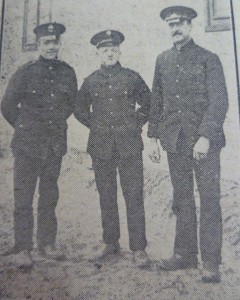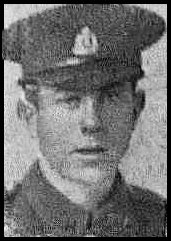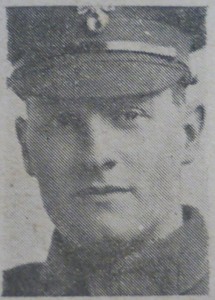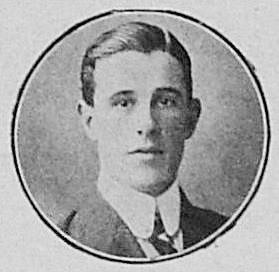From the “Bexhill Observer” – 24th July 1915
INTERNED BY GERMANS
Private George Eden, R.A.M.C., of Boxhedge, Nelthorpe, Banbury – brother of Mrs George Abbott, of Holly Cottage, Belle Hill – has just returned to his home after being interned since August, in Germany, after the Battle of Mons. He was, with others, in charge of three hospitals in Laudricies, and, remaining in charge of the wounded, was with the corps in the town as a German patrol entered, treacherously led by an officer in French uniform (a spy), who was shot by the guard, still on duty, when his treachery was discovered.
Private Eden, with 250 of the R.A.M.C. were taken prisoners, when they were marched to Mons, and were paraded round the town. Then they were sent to the Paderborn Camp in Westphalia. “After crossing the frontier,” says Private Eden, “the Germans would not give a fainting prisoner a drop of water: rations were terribly short, eight men having to share one loaf.”
The interesting story is too long to quote fully, but Private Eden says his sister sent him parcels regularly, which enabled him to get fairly moderate sustenance. Without these presents – they were living in huts which they had themselves built – the men would have been literally starving, so scanty were the rations.
After ten months detention, Private Eden, with the others of the R.A.M.C. were freed, and came home through Holland (where the men had a splendid reception), and after a short respite, he is rejoining the R.A.M.C. at Aldershot.
From the “Bexhill Observer” 11th January 1919
IN ‘THE HELL OF GERMANY’
 Looking better for a week or two in England and a good time in Copenhagen and Scotland on the way, Corporal J. Dadswell, Royal Sussex Regiment, has returned to his home, 21, North-Road, Sidley.
Looking better for a week or two in England and a good time in Copenhagen and Scotland on the way, Corporal J. Dadswell, Royal Sussex Regiment, has returned to his home, 21, North-Road, Sidley.
He was made prisoner in 1916, and at that time was wounded in the shoulder and the muscle of the arm, and through the knee. For the first eight months he had a very rough time. Afterwards, when he got things from England, it was better. The first parcel he received was an emergency one from Eastbourne and he subsequently got them much more regularly than has been the case with many prisoners. Corporal Dadswell pays a warm tribute to Mrs Rawlins in regard to parcels and also for letters; he thanks other friends at Bexhill and Eastbourne for these. “Mrs Rawlins has been a great help to us. I am sure I cannot speak too highly of it,” said he.
Corporal Dadswell was treated roughly in hospital at first, and was fed on soup made of grass and cabbage. Afterwards he was with Belgian Red Cross nurses and the treatment was better. He and his comrades were taken to Cologne and in spite of their wounded condition they were driven for about two hours round the town in the Red Cross tramcars with open sides and curtains, in which their stretches had been placed on shelves. Corporal Dadswell’s arm was in plaster of Paris at the time, which necessarily caused much irritation, and this making a spectacle of the wounded prisoners for an unduly long time was not calculated to improve their health, apart from its bad taste.
“I have met with friends, but they have been very few” was Corporal Dadswell’s summing-up of his experiences with the enemy. He went through what was practically starvation, and it was his fate to be sent to Standal and afterwards to Wittonberg-on-Elbe, which was unpleasantly known as “the hell of Germany.” It was regarded as a “punishment camp,” by way of reprisal for German prisoners, who were supposed to be working hard in England. Corporal Dadswell, however, did not work there; to get away from the camp he volunteered for work on a small farm, where he was better treated. Altogether he spent about eighteen months of his captivity in hospital.
In 1916 the Germans would not find them a piece of coal and the only thing they could do after breakfast was to roll themselves in their blankets. The first suit he had after being taken prisoner was made out of a German blanket.
By “squaring” Germans with tobacco and collecting pennies and twopences until they amounted sometimes to as much as 12s, the prisoners were able now and then to see the “Daily Express” and “Daily Mirror,” which had come into Germany through neutral countries. The Germans at one time seemed quite to believe that he and his comrade’s would be in the German Army before long. “But we knew that if it took another 10 years we should win,” said he.
Coming back by way of Denmark they sometimes saw as many as 10 mines together in those seas. Copenhagen they found a very fine city.
In Scotland they had the first real “English” feed since Corporal Dadswell was at Cooden Camp. It was provided by ladies and the fare comprised hot sausage rolls and tea. Ladies afterwards handed bags which contained biscuits, cheese, chocolate and soap.
From the “Bexhill Observer” 18th January 1919
HOME FROM GERMANY
IN THE SALT MINES
 A young soldier, Private J. T. Harmer, 2/5th Manchester Regiment, is home at 18 Camperdown-Street, Sidley.
A young soldier, Private J. T. Harmer, 2/5th Manchester Regiment, is home at 18 Camperdown-Street, Sidley.
Private Harmer was one of those captured on the 21st March last year. He has spent most of his time in the salt mines at a village a long way from the frontier, and his work was chiefly pushing trucks. The food and conditions affected his health, but he is now looking better. His companions in misfortune were mostly men of the Kings Liverpool Regiment and Durham Light Infantry. He got his Red Cross parcels well, and speaks in high praise of that work.
Private Harmer came back through Holland. The Dutch received them well.
VERY LITTLE FOOD
 A member of a family well known in business circles in Bexhill and Uckfield, Private W. H. Warburton, Grenadier Guards, of Greenhyrst, Station-road, Bexhill has returned home safely, and is looking well.
A member of a family well known in business circles in Bexhill and Uckfield, Private W. H. Warburton, Grenadier Guards, of Greenhyrst, Station-road, Bexhill has returned home safely, and is looking well.
Private Warburton joined up about two years ago, and went to France 12 months ago last August. He was taken prisoner last April.
Like many others, he had a rough time behind the enemy’s lines at first. Then he got influenza and after three weeks in hospital he was sent to a convalescent camp in Germany. In his working time he had some very stiff jobs on railway and road making and in carrying bricks up ladders. Behind the lines he carried stretcher cases, both Germans and our own people. He had very little food till he began to receive parcels in August.
Coming back they travelled across Germany in cattle trucks for two days and nights. In Holland the Dutch entertained them with concerts and dances, and gave them food and proper train accommodation.
NOT ILL-TREATED
Among those safely returned is Lance-Corporal A. B. Elgar, 9th Battalion, Royal Sussex, of 24, Windsor-road.
He was captured last March, and was sent to Lagensalza. So others were badly treated, but he personally was not. He worked at plate laying on a railway, and much preferred this to the camp. He got the regimental parcels regularly, but of those sent personally, containing cigarettes or tobacco, he only received one.
Coming back through Holland he had a very good reception.
BACK THROUGH BELGIUM
Private H. Makin, Royal Sussex Regiment, another of those who were captured last April, has returned, and is at 14, Salisbury-road. It will be remembered that in France he underwent a transfusion of blood to a comrade.
He had a hard time behind the German lines for some months. Afterwards a German soldier struck him on the ankle with a rifle and he was in hospital, where he was better treated.
He came back through Cologne and the Belgian battlefields, and had a hearty welcome at Liege and Mons.
From the “Bexhill Observer” – 25th January 1919
FIGHTING FOR CRUMBS
WHAT A BEXHILL PRISONER SAW
 A young Bexhill man, Private H. E. Prosser, Hampshire Regiment, whose experiences in captivity were recently published in the “Bexhill Observer,” has given additional details in an interesting letter to Mrs Kate Rawlins, in which he refers to the kind efforts and work of the Red Cross in sending parcels.
A young Bexhill man, Private H. E. Prosser, Hampshire Regiment, whose experiences in captivity were recently published in the “Bexhill Observer,” has given additional details in an interesting letter to Mrs Kate Rawlins, in which he refers to the kind efforts and work of the Red Cross in sending parcels.
Describing his four years in Germany, and especially the time in Sennelager Camp, Private Prosser says: – “I have seen Englishmen fight between themselves till they became exhausted over the crumbs which were left after the small portions of black bread had been cut up and distributed. Potato peelings were eagerly sought for, and cooked and eaten. I have seen hundreds of men smoking peat, having no Tobacco, and tea leaves were dried and smoked.”
The Camp was surrounded by double barbed wire, with electric wire between. On one occasion a German workman was working near this, filling in the space beneath with sand, when suddenly his foot slipped on the spade and he fell against the livewire. Death was instantaneous. Some of the Germans threw a steel rope over to the man, with the intention of directing the current into the earth, but the rope fell across the wire and the man together, directing the current into him. Private Prosser continues, “We then saw the body slowly burning. On the other side of the wire stood the Germans, some laughing at the ghastly sight. When the current was turned off half the man’s body was burned away.” Many inventions were made by the English and French to carry the current into the earth and allow them to escape. One invention by a Frenchman was like a bassionette to be pushed against the wire. It was tried by an Englishman on a dark night, the idea being to let it go before it touched the wire. However, it was not a success. A tunnel was then dug under the wires to a bush about ten yards beyond. It was started under the hut nearest to the wires, and the men worked at night for three months. Another night would have seen it finished, but it was discovered through treachery on the part of a man of another nationality. It took the Germans two hours to find the entrance to the tunnel.
Other Articles in this section:

